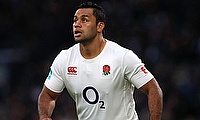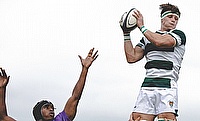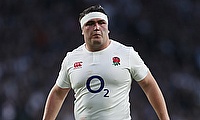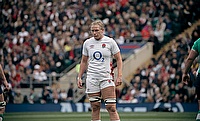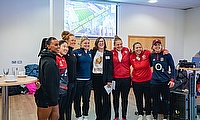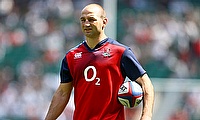A new England: How will Borthwick's bronze medallists shape up in the future?
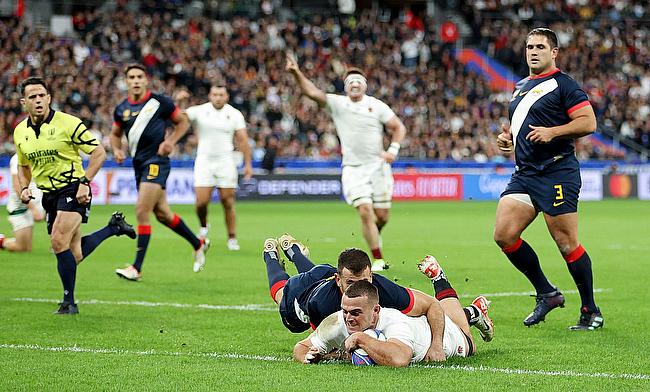
England's win against Argentina in the World Cup third-place play-off felt like the end of an era
©Photo by Michael Steele - World Rugby/World Rugby via Getty Images
"I don't feel bad about letting you go, I just feel sad about letting you know."
Those are the lyrics to Billy Bragg's 1983 hit 'A New England' which nicely summarises where English rugby seems to be right now.
England ended an era with a victory over Argentina in last Friday's World Cup third-place play-off with stalwarts such as Ben Youngs, Courtney Lawes, and Jonny May retiring from international duty and Joe Marler doing all but the same.
In Manu Tuilagi, Jamie George, Dan Cole and Danny Care, they have four more players aged above 32. Between the eight names listed, there is an average of 93 caps.
The sense of a new beginning has indeed arrived for English rugby as Steve Borthwick, appointed in December 2022, now embarks on his first full coaching cycle.
Squeezed for time heading into this year's World Cup, Borthwick's first 10 months in charge, selection-wise, have been ultimately underlined by keeping faith in the players that had defined Eddie Jones' tenure.
Perhaps that is why the former England boss told The Telegraph this week that the national side have failed to evolve beyond ‘bread and butter’ rugby under Borthwick.
Maybe the bread Jones mentions has become stale - justifiably or not - in the eyes of England fans. Sticking with players like Youngs, May, Marler as well as Owen Farrell and Billy Vunipola, plus recalls for Cole and Care, have led to a source of disconnect between the team and supporters who are craving an influx of fresh talent.
Whilst this may not be fair because England had more players under the age of 25 than any of the other World Cup semi-finalists, the feeling is that while it is sad to see numerous heroes leave, it's a good thing for the team.
However, looking ahead, is this really the case?
Front-Row
The most crucial selection dilemma that faces Borthwick is in the front-row. Marler and Cole's deputies, Ellis Genge and Kyle Sinckler, were decimated in the scrum in the latter stages of the semi-final vs South Africa, meaning it is now two consecutive World Cups where England's scrummaging has come in for some scrutiny when it has mattered most.
Jamie George played three consecutive 80 minutes [v Samoa, Fiji and South Africa] and whilst his back-up Theo Dan seems promising, past him, there is a startling lack of strength in depth.
Such is the dearth of English scrummaging props in the here and now, could Borthwick be best advised to keep Cole around to help nurture the tightheads in waiting into international-class scrummagers?
There is some talent on the radar outside the World Cup squad. In the Premiership, Finn Baxter (21-year-old loosehead and England age-group captain) and Joe Heyes (24-year-old seven-cap tighthead) deputise respectively for Marler and Cole at club level so could be strong options.
Given Marler and Cole’s performances at the World Cup, what is to say Sinckler and Genge can't lift their game again whilst fan favourite Val Rapava-Ruskin (31-year-old Gloucester loosehead) could be in with a shout after returning from injury?
Second-Row/Back-Row
Elsewhere in the squad, letting go is a bit easier. Whilst the retirement of arguably England's best player over the last four years, Courtney Lawes, can seem alarming, look no further than the present. George Martin came of age in the World Cup semi-final, and Ollie Chessum has been a standout since his debut in July 2022.
Twenty-two and 23-years-old respectively, both were deployed in the back row by Borthwick at Leicester with Martin playing over two-thirds of his career in that position.
Any three of Maro Itoje, Chessum and Martin could follow the Lawes lock/flanker hybrid, but there is also no shortage of flankers who can bolster England's back-row. Sam Underhill made a Herculean return against Argentina and Tom Curry has rediscovered some form.
Chandler Cunningham-South and Jack Kenningham have shown excellent form in the Premiership recently and are under 25 years old. England's player of the World Cup, Ben Earl, could also return to the flank. It wouldn't be unruly to suggest that, given England hinted at ulterior long-term motives during the warm-ups by handing debuts to Tom Willis and Tom Pearson.
Borthwick's selection of Billy Vunipola suggested a preference for a big number eight, but he showed versatility and faith in form by eventually settling on the smaller Earl, which could be good news for Gloucester's Zach Mercer.
The Backs
From switching full-backs during the World Cup to rotating first-choice scrum halves during the Premiership play-offs in Leicester Tigers' title-winning season of 2021-22, Borthwick places an absolute premium on building on a weekly basis and taking each game as it comes.
At Leicester, Borthwick's first season was spent experimenting with his squad and blooding new talent - many of whom are mainstays in today's England team - before going on to win the title.
Whilst there was a limit on how many new players he could introduce in the shadow of a World Cup, Borthwick can now begin to seriously start shaping his vision for England and fans could expect a long-awaited end to Eddie Jones's 'saving it for the World Cup' philosophy.
This is because Borthwick's teams are always versatile, so there is less importance placed on riding a repeatable gameplan for perceived bigger occasions.
This is why England fans could expect to see other top Premiership talents. Scrum-half Gus Warr of Sale Sharks kicked the most metres in the Premiership last year and could feature in games that, like the World Cup semi-final, will revolve around kicking.
Marcus Smith could also feature again at full-back. Borthwick has a history at Leicester of playing 10s in the 15 shirt, and of playing full-backs, like Freddie Steward, on the wing to offer protection in the air - as seen against Argentina in the third-place play-off.
This could spell returns for the likes of Tommy Freeman, more game time for Henry Arundell or an introduction for Northampton's James Ramm or George Hendy.
Borthwick's meticulous planning could also indicate the highly anticipated selection of Harlequins winger Cadan Murley, who surely did not spend the entirety of England's pre-season in training to not feature at all going forwards.
It also poses an interesting question around Joe Marchant. The centre, who started six of England's seven games at the World Cup [albeit one of them on the wing v Samoa] will be ineligible given his move to Stade Français, but versatile centres - Borthwick favourite Guy Porter, Elliot Daly and Henry Slade come to mind.
They provide extra aerial coverage to facilitate a playmaker at full-back who are potentially at a premium for the next four years. The application for special dispensation for Arundell, despite his move to Racing 92, could also hint at an avant-garde approach to England's selection policies.
On the face of it, there is a wealth of talent waiting in the wings for a fresh era and a coaching team with a history of selection curveballs. Borthwick and his current backroom staff also have a history of success following an experimental period.
Both on the pitch and off it in terms of winning mentality, we really could be looking at a new England. Maybe we shouldn't feel bad about letting go.


